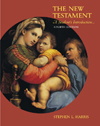 |
1 |  | 
Paul's dominant concern in his early letters is the concept of __________________. |
|  | A) | eschatology |
|  | B) | the doctrine of sin |
|  | C) | church government |
|  | D) | sexual ethics |
 |
 |
2 |  | 
First Corinthians is the oldest surviving Christian document. |
|  | A) | True |
|  | B) | False |
 |
 |
3 |  | 
Thessalonica was the capital of the Roman province of _________________. |
|  | A) | Judea |
|  | B) | Achaia |
|  | C) | Asia |
|  | D) | Macedonia |
 |
 |
4 |  | 
The content of the oral gospel that Paul preached in the marketplaces, shops, and private homes of Thessalonica is known by the Greek term ____________________. |
|  | A) | Parousia. |
|  | B) | Logos. |
|  | C) | kerygma. |
|  | D) | sophia. |
 |
 |
5 |  | 
In 1 Thessalonians, Paul encourages the Thessalonian believers to respond to the nearness of the Parousia of Christ by _________________________. |
|  | A) | telling all of their friends about Jesus. |
|  | B) | quitting their jobs and leaving their families. |
|  | C) | eating, drinking, and being merry. |
|  | D) | abstaining from sexual immorality. |
 |
 |
6 |  | 
The text of 1 Thessalonians seems to indicate that the Thessalonians were worried about whether their dead Christian friends would miss the blessings available to believers still alive at the Second Coming of Christ. |
|  | A) | True |
|  | B) | False |
 |
 |
7 |  | 
Paul claims in 1 Thessalonians that only the spiritually pure will be able to calculate the exact date and time of Christ's Parousia. |
|  | A) | True |
|  | B) | False |
 |
 |
8 |  | 
When Paul first visited Corinth on his second missionary journey, he stayed for approximately ________________. |
|  | A) | a year and a half |
|  | B) | three days |
|  | C) | forty days |
|  | D) | seventy days |
 |
 |
9 |  | 
Scholars believe that 2 Corinthians may be a patchwork of several different letters that Paul wrote to Corinth. |
|  | A) | True |
|  | B) | False |
 |
 |
10 |  | 
In Paul's day, the city of Corinth was known for _________________. |
|  | A) | its conservative lifestyle. |
|  | B) | its libertine lifestyle. |
|  | C) | its poverty. |
|  | D) | its extremely cold climate. |
 |
 |
11 |  | 
Paul spends considerable space in 1 Corinthians encouraging his readers to overcome their intra-church rivalries and suspicion. |
|  | A) | True |
|  | B) | False |
 |
 |
12 |  | 
The most important distinction that Paul makes in 1 Cor. 1-2 is between the concepts of _____________________. |
|  | A) | darkness and light. |
|  | B) | sickness and wellness. |
|  | C) | life and death. |
|  | D) | wisdom and foolishness. |
 |
 |
13 |  | 
Paul criticizes the Corinthians in 1 Corinthians because they will not excommunicate a church member who is guilty of __________________. |
|  | A) | theft |
|  | B) | incest |
|  | C) | murder |
|  | D) | gossiping |
 |
 |
14 |  | 
Paul's general principle for personal relationships in 1 Corinthians is that_____________________. |
|  | A) | married Christians need not remain married. |
|  | B) | God desires everyone to be married. |
|  | C) | marriage is sinful. |
|  | D) | married people should remain married; and single people should remain single. |
 |
 |
15 |  | 
Paul's position in 1 Corinthians on eating idol meat is that ______________________. |
|  | A) | Christians should never eat it. |
|  | B) | Christians have a right to eat it if they want to. |
|  | C) | Christians should not eat meat at all. |
|  | D) | Christians have a right to eat idol meat, but they should forego that right if it offends a fellow Christian. |
 |
 |
16 |  | 
In 1 Cor. 11, Paul places restrictions on women's participation in church services, saying that women cannot pray or prophesy in church when men are present. |
|  | A) | True |
|  | B) | False |
 |
 |
17 |  | 
In 1 Cor. 11, Paul criticizes the Corinthians' observance of the Lord's Supper, claiming that the Corinthians ________________. |
|  | A) | had turned the Supper into a riotous drinking party. |
|  | B) | used grape juice instead of wine. |
|  | C) | used leavened bread instead of unleavened bread. |
|  | D) | did not pray before they partook of the elements of the Supper. |
 |
 |
18 |  | 
First Corinthians 15 preserves the earliest tradition of Jesus' postresurrection appearances to his disciples. |
|  | A) | True |
|  | B) | False |
 |
 |
19 |  | 
Many scholars believe that 2 Cor. 10-13 is actually to be dated earlier than 2 Cor. 1-9. |
|  | A) | True |
|  | B) | False |
 |
 |
20 |  | 
In 2 Cor. 10-13, Paul uses sarcasm and irony to attack a group he calls "the idiot apostles" who had undermined the church's confidence in Paul's apostolic authority. |
|  | A) | True |
|  | B) | False |
 |



 2002 McGraw-Hill Higher Education
2002 McGraw-Hill Higher Education